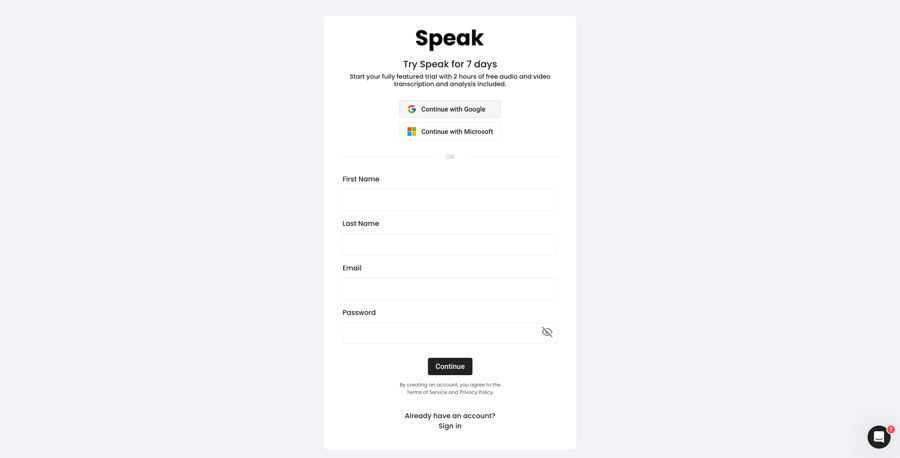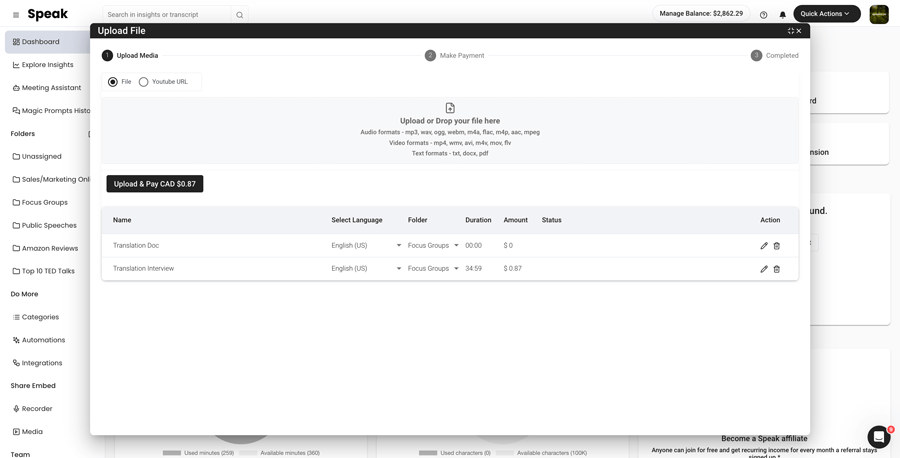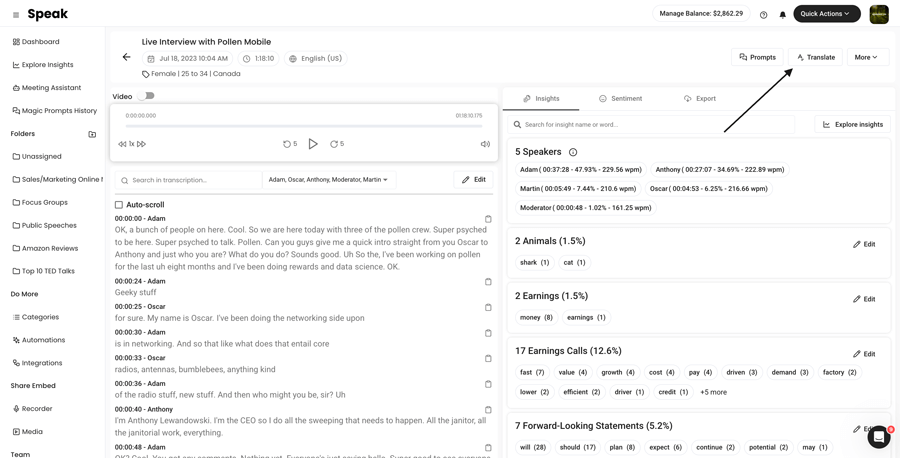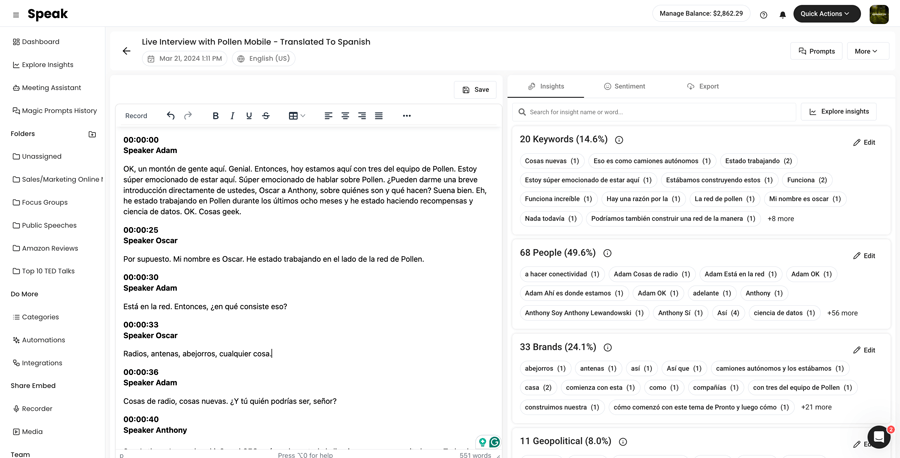How To Translate German to Uyghur
Translating German to Uyghur is super simple!

Step 1: Register for Speak
Register for Speak using this link.
Once you register, you can instantly begin translating your German to Uyghur file(s).

Step 2: Upload Your German file(s)
As soon as you log in, you will be redirected to the dashboard.
Once there, you can select the Quick Action "New Upload".
In Speak, you can seamlessly upload, transcribe and translate audio, video and text files all at once!

Step 3: Translate Your German file(s) to Uyghur
Once the file is uploaded, simply visit your file and select "Translate".
If it is an audio and video file, Speak will ask you if you want to keep the speaker names and timestamps in the translation.
Want to translate many files at once? No problem!
You can view the files you want to automatically translate from German to Uyghur from the folder level and instantly translate as many files as you need with our artificial intelligence translation in just a few clicks.

Step 4: That's It! View, Analyze, Modify & Export Your New Uyghur file(s)
Once the translation is done, you will be alerted and you will see a new document in the same folder your original file is in.
The file will be named the same but with a dash indicating that it is the translated version.
Need support with your German translation?
We are always here and happy to help at Speak!
Just send us a message on live chat on the bottom right corner and we will ensure you are set up for success.
Interested in translating German or other languages to different languages? View our entire list of supported translation languages here.
Automatic, accurate, instant AI translation from German to Uyghur is here for you.
Register for Speak using this link and begin translating German to Uyghur today.
Unlocking New Horizons: The Power of Translating German to Uyghur
In today's global landscape, the ability to communicate across languages is not just beneficial; it's essential. With advancements in AI translation, barriers are being broken down daily, opening up new opportunities for researchers, businesses, and individuals alike. Translating German to Uyghur, two linguistically distinct languages, is a prime example of how technology fosters unique connections and understanding across cultures.
Why Translate German to Uyghur?
At first glance, German and Uyghur might seem worlds apart. But in the realm of communication, education, and business, the act of translating between these two languages can have profound implications. From academic research to expanding business markets, the reasons for German to Uyghur translation are as varied as they are important.
The Importance for Researchers
German is widely acknowledged for its rich contributions to science, philosophy, and literature. For Uyghur-speaking researchers, access to documents, studies, and literary works in German can unlock a wealth of knowledge and insight. The reverse is equally true, with German-speaking scholars gaining access to Uyghur culture and history through translation.
Benefits for Businesses
The economic ties between German and Uyghur-speaking regions are growing stronger. Businesses looking to operate or expand in these areas can significantly benefit from accurate translation. It enables clear communication, fosters mutual understanding, and helps to navigate the nuances of local markets.
Time and Cost Savings
Automatic translations, powered by AI and NLP (Natural Language Processing) technologies, offer significant time and cost advantages over traditional translation methods. By leveraging Speak AI's software, businesses and researchers can access instant, accurate translations, thereby streamlining workflows and reducing operational costs.
Meet Speak AI: Your Translation Powerhouse
Speak AI, an industry leader with a 4.9 rating on G2 and over 150K users, is at the forefront of revolutionizing how we interact with languages. Our software integrates NLP, large language models, data visualization, and Generative AI, making it an ideal tool for translating between German and Uyghur.
AI Meeting Assistant
Our AI Meeting Assistant is a game-changer for businesses and researchers working with multilingual teams or subjects. It seamlessly joins calls on platforms like Microsoft Teams, Zoom, Google Meet, and Webex to automatically transcribe and analyze meetings in real-time. This capability is invaluable for capturing accurate translations of discussions and presentations in either German or Uyghur.
Why Choose Speak AI?
- Accuracy: Leveraging advanced AI, our translations preserve the meaning and context of the original text or speech.
- Speed: Instant translations eliminate waiting times associated with traditional methods.
- Cost-Effectiveness: Automatic translation significantly reduces the expense of hiring human translators.
- User-Friendly: Our platform is designed for ease of use, regardless of technical expertise.
German and Uyghur: A World of Opportunities
Translating between German and Uyghur opens a door to a realm of possibilities. Whether it's for academic research, business expansion, or personal growth, the benefits are immense. Speak AI is committed to empowering users with the tools needed to navigate this exciting frontier.
Exploring German and Uyghur
Geographical and Demographic Insights
German is primarily spoken in Germany, Austria, Switzerland, Luxembourg, and Liechtenstein, boasting around 100 million native speakers. Uyghur, on the other hand, is predominantly spoken in the Xinjiang Uyghur Autonomous Region in China by approximately 10 million people. Despite their geographical distance, these languages bridge diverse cultures.
Interesting Linguistic Fun Facts
German is known for its compound words that can describe precise emotions or situations in a single term, such as "Fernweh", the longing for distant places. Uyghur, with its Turkic roots, offers a rich oral tradition and a unique script that has undergone several transformations over the centuries.
Differences and Similarities
While German belongs to the Indo-European family and uses the Latin script, Uyghur is part of the Turkic language family and traditionally uses the Arabic script. Despite their differences, both languages share the universal human experience conveyed through their rich literary and cultural expressions.
Conclusion
Translating German to Uyghur is not just about converting words from one language to another; it's about connecting worlds. With the aid of technologies like those provided by Speak AI, these translations become not just possible but also efficient, accurate, and cost-effective. Embrace the power of AI translation and open up a world of possibilities today.
Ready to Transform Your Translating Experience?
Join over 150K users who are already benefiting from the innovative solutions offered by Speak AI. Whether you're looking to translate academic research, business documents, or simply explore a new culture, Speak AI is your partner in bridging languages effortlessly. Discover the future of translation. Sign up now and take the first step towards global communication without boundaries.
---
**Geographical and Demographic Locations of German and Uyghur:**
- **German:** Primarily spoken in Germany, Austria, Switzerland, Luxembourg, and Liechtenstein with about 100 million native speakers worldwide.
- **Uyghur:** Mainly spoken in the Xinjiang Uyghur Autonomous Region in China, with approximately 10 million speakers.
**Interesting Stats and History:**
- German is one of the major languages of the world, used as a first language by about 100 million people worldwide.
- Uyghur, belonging to the Turkic language family, has a rich history of literature and has used several scripts throughout its history, including the Old Turkic alphabet, Arabic script, Latin script, and Cyrillic script at different times.
**Fun Facts:**
- German is renowned for its compound nouns, which can describe complex concepts in a single word.
- Uyghur music and poetry are integral parts of its culture, with Muqam being a prominent traditional Uyghur musical form.
**Differences and Similarities:**
- **Differences:** German uses the Latin script and belongs to the Germanic branch of the Indo-European language family, whereas Uyghur traditionally uses the Arabic script and belongs to the Turkic language family.
- **Similarities:** Both languages have rich traditions of literature and have undergone significant evolution over time, reflecting the adaptability and enduring nature of human communication.
Translate German To These Other Supported Languages:
- Translate German-to-Afrikaans
- Translate German-to-Albanian
- Translate German-to-Amharic
- Translate German-to-Arabic (Egypt)
- Translate German-to-Arabic (Iraq)
- Translate German-to-Arabic (Israel)
- Translate German-to-Arabic (Jordan)
- Translate German-to-Arabic (Kuwait)
- Translate German-to-Arabic (Lebanon)
- Translate German-to-Arabic (Oman)
- Translate German-to-Arabic (Palestinian Authority)
- Translate German-to-Arabic (Qatar)
- Translate German-to-Arabic (Saudi Arabia)
- Translate German-to-Arabic (Syrian Arab Republic)
- Translate German-to-Arabic (United Arab Emirates)
- Translate German-to-Arabic Modern Standard (Bahrain)
- Translate German-to-Armenian
- Translate German-to-Assamese
- Translate German-to-Aymara
- Translate German-to-Azerbaijani
- Translate German-to-Bambara
- Translate German-to-Basque
- Translate German-to-Belarusian
- Translate German-to-Bengali
- Translate German-to-Bhojpuri
- Translate German-to-Bosnian
- Translate German-to-Bulgarian
- Translate German-to-Catalan
- Translate German-to-Cebuano
- Translate German-to-Chinese (Simplified)
- Translate German-to-Chinese (Traditional)
- Translate German-to-Corsican
- Translate German-to-Croatian
- Translate German-to-Czech
- Translate German-to-Danish
- Translate German-to-Dari
- Translate German-to-Dhivehi
- Translate German-to-Dogri
- Translate German-to-Dutch
- Translate German-to-English
- Translate German-to-English (Australia)
- Translate German-to-English (Indian)
- Translate German-to-English (Irish)
- Translate German-to-English (New Zealand)
- Translate German-to-English (Scottish)
- Translate German-to-English (South African)
- Translate German-to-English (United Kingdom)
- Translate German-to-English (United States)
- Translate German-to-Esperanto
- Translate German-to-Estonian
- Translate German-to-Ewe
- Translate German-to-Farsi (Persian)
- Translate German-to-Filipino Tagalog
- Translate German-to-Finnish
- Translate German-to-French
- Translate German-to-French (Canada)
- Translate German-to-Frisian
- Translate German-to-Galician
- Translate German-to-Georgian
- Translate German-to-German
- Translate German-to-German (Swiss)
- Translate German-to-Greek
- Translate German-to-Guarani
- Translate German-to-Gujarati
- Translate German-to-Haitian Creole
- Translate German-to-Hausa
- Translate German-to-Hawaiian
- Translate German-to-Hebrew
- Translate German-to-Hindi
- Translate German-to-Hmong
- Translate German-to-Hungarian
- Translate German-to-Icelandic
- Translate German-to-Igbo
- Translate German-to-Ilocano
- Translate German-to-Indonesian
- Translate German-to-Irish
- Translate German-to-Italian
- Translate German-to-Japanese
- Translate German-to-Javanese
- Translate German-to-Kannada
- Translate German-to-Kazakh
- Translate German-to-Khmer
- Translate German-to-Kinyarwanda
- Translate German-to-Konkani
- Translate German-to-Korean
- Translate German-to-Krio
- Translate German-to-Kurdish
- Translate German-to-Kurdish (Sorani)
- Translate German-to-Kyrgyz
- Translate German-to-Lao
- Translate German-to-Latin
- Translate German-to-Latvian
- Translate German-to-Lingala
- Translate German-to-Lithuanian
- Translate German-to-Luganda
- Translate German-to-Luxembourgish
- Translate German-to-Macedonian
- Translate German-to-Maithili
- Translate German-to-Malagasy
- Translate German-to-Malay
- Translate German-to-Malayalam
- Translate German-to-Maltese
- Translate German-to-Maori
- Translate German-to-Marathi
- Translate German-to-Meiteilon (Manipuri)
- Translate German-to-Mizo
- Translate German-to-Mongolian
- Translate German-to-Myanmar (Burmese)
- Translate German-to-Nepali
- Translate German-to-Norwegian
- Translate German-to-Nyanja (Chichewa)
- Translate German-to-Odia (Oriya)
- Translate German-to-Oromo
- Translate German-to-Pashto
- Translate German-to-Persian
- Translate German-to-Polish
- Translate German-to-Portuguese
- Translate German-to-Portuguese (Brazilian)
- Translate German-to-Portuguese (Portugal)
- Translate German-to-Punjabi
- Translate German-to-Quechua
- Translate German-to-Romanian
- Translate German-to-Russian
- Translate German-to-Samoan
- Translate German-to-Sanskrit
- Translate German-to-Scots Gaelic
- Translate German-to-Sepedi
- Translate German-to-Serbian
- Translate German-to-Sesotho
- Translate German-to-Shona
- Translate German-to-Sindhi
- Translate German-to-Sinhala
- Translate German-to-Sinhala (Sinhalese)
- Translate German-to-Slovak
- Translate German-to-Slovenian
- Translate German-to-Somali
- Translate German-to-Spanish
- Translate German-to-Spanish (Mexico)
- Translate German-to-Sundanese
- Translate German-to-Swahili
- Translate German-to-Swedish
- Translate German-to-Tajik
- Translate German-to-Tamil
- Translate German-to-Tatar
- Translate German-to-Telugu
- Translate German-to-Thai
- Translate German-to-Tigrinya
- Translate German-to-Tsonga
- Translate German-to-Turkish
- Translate German-to-Turkmen
- Translate German-to-Twi (Akan)
- Translate German-to-Ukrainian
- Translate German-to-Urdu
- Translate German-to-Uyghur
- Translate German-to-Uzbek
- Translate German-to-Vietnamese
- Translate German-to-Welsh
- Translate German-to-Xhosa
- Translate German-to-Yiddish
- Translate German-to-Yoruba
- Translate German-to-Zulu



